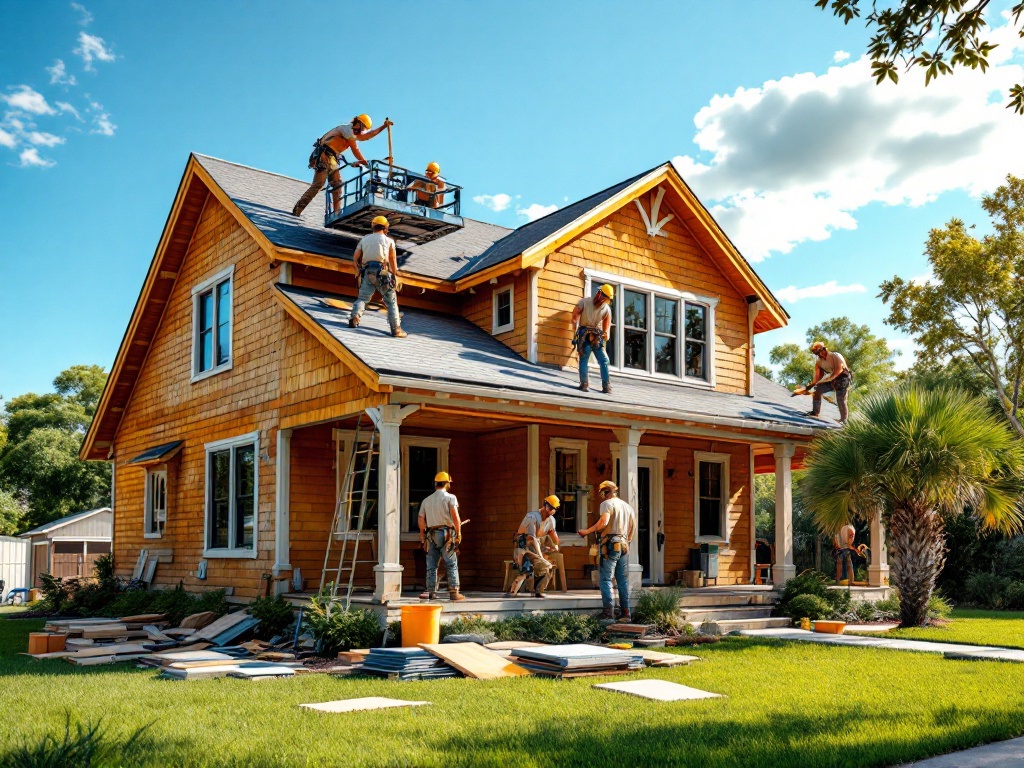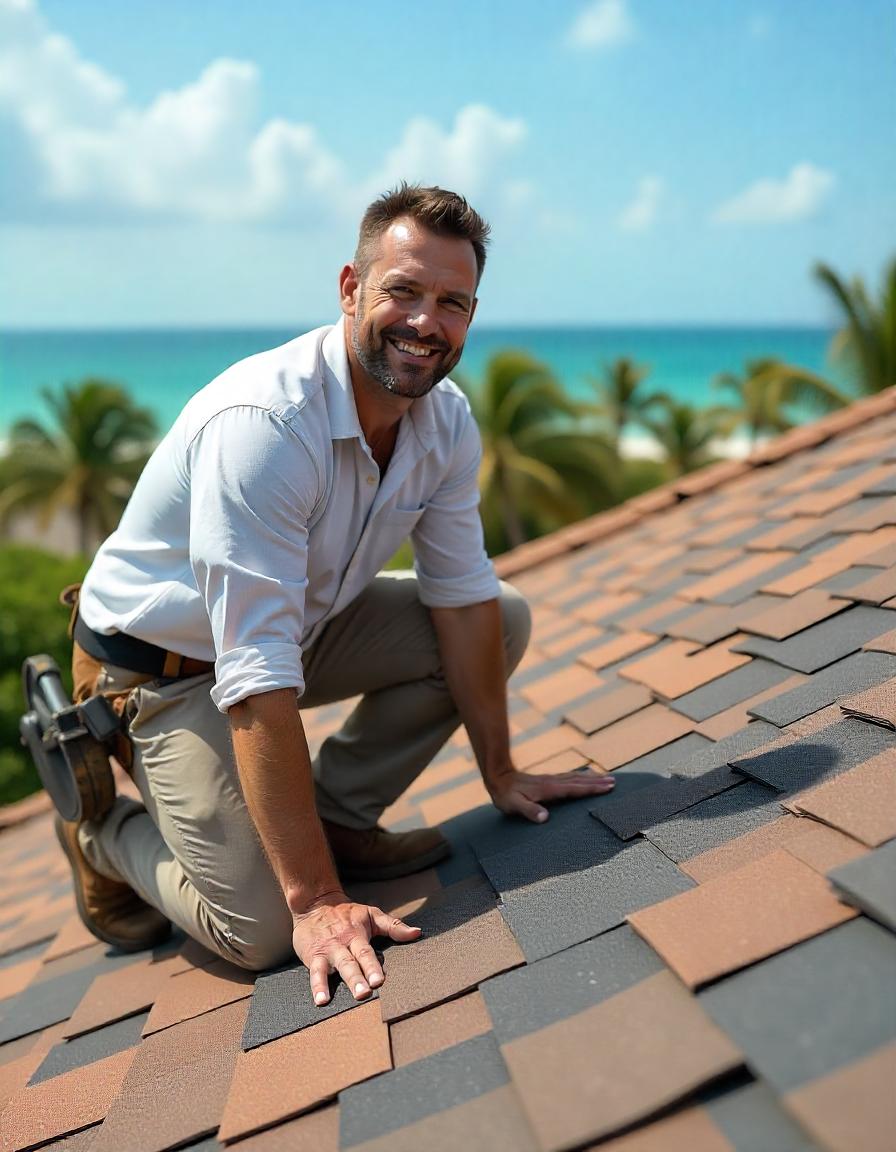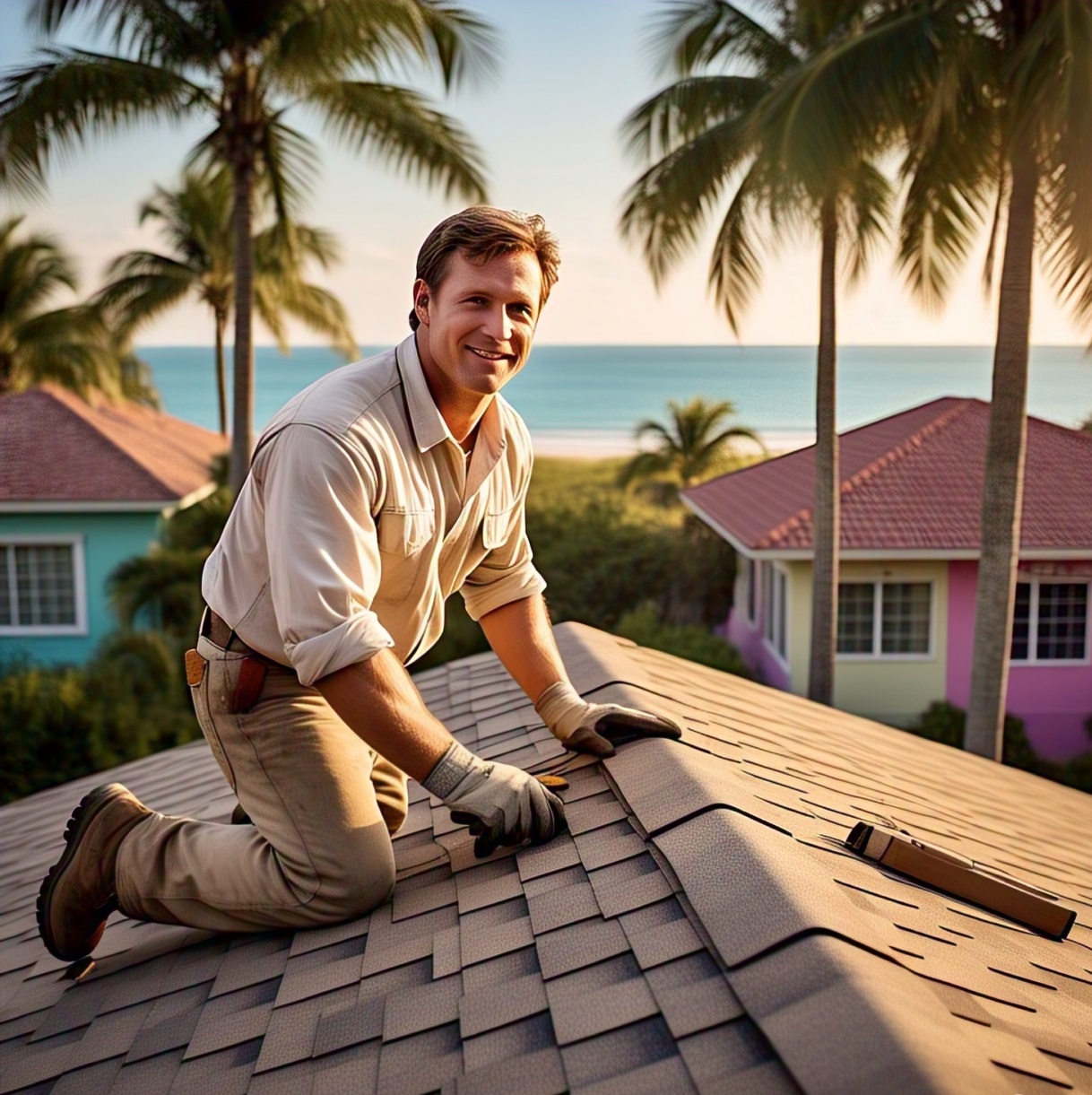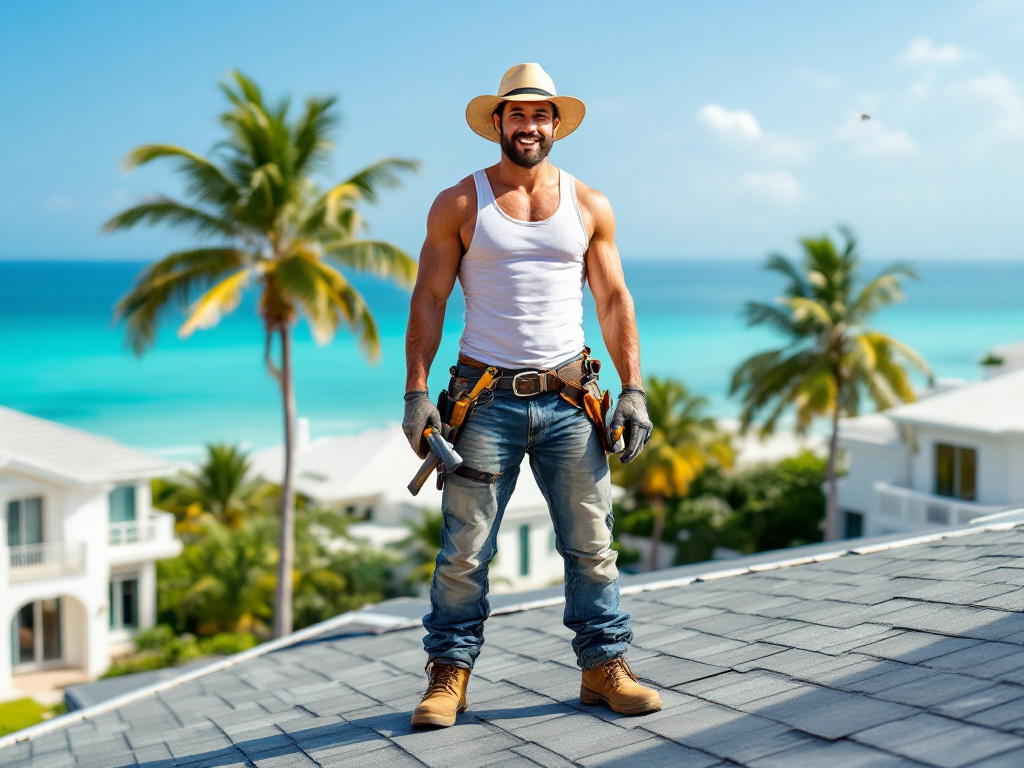
Introduction: Why Roofing Matters for Jacksonville Homeowners
 Your roof is your home’s first line of defense against Jacksonville’s relentless weather. In Duval County, Florida, homeowners face a humid subtropical climate that brings intense sun, heavy rainfall, high humidity, and the ever-present threat of hurricanes. Choosing the right roofing materials for longevity isn’t just about aesthetics—it’s about protecting your investment, boosting energy efficiency, and ensuring your home withstands Northeast Florida’s unique challenges. Whether you live in Riverside’s historic charm, Mandarin’s suburban sprawl, or the coastal elegance of Jacksonville Beach, the right roof can save you thousands in repairs and enhance your property’s value.
Your roof is your home’s first line of defense against Jacksonville’s relentless weather. In Duval County, Florida, homeowners face a humid subtropical climate that brings intense sun, heavy rainfall, high humidity, and the ever-present threat of hurricanes. Choosing the right roofing materials for longevity isn’t just about aesthetics—it’s about protecting your investment, boosting energy efficiency, and ensuring your home withstands Northeast Florida’s unique challenges. Whether you live in Riverside’s historic charm, Mandarin’s suburban sprawl, or the coastal elegance of Jacksonville Beach, the right roof can save you thousands in repairs and enhance your property’s value.
Jacksonville’s weather demands roofing materials that resist mold, endure high winds, and reflect heat to keep cooling costs down. With over 50 inches of annual rainfall and temperatures often exceeding 90°F, durability is non-negotiable. Add the risk of storms like Hurricane Ian in 2022, which battered Duval County, and it’s clear why Jacksonville homeowners need roofs built to last. The wrong choice could mean frequent repairs or premature replacement, draining your budget. For example, poorly chosen materials in storm-prone areas like Ponte Vedra or Atlantic Beach can lead to costly damage from wind or water infiltration, impacting both your home’s safety and resale potential.
Beyond weather, Jacksonville’s vibrant communities add unique considerations. Historic neighborhoods like Avondale and Springfield often require roofing that preserves architectural integrity, aligning with Duval County’s heritage preservation guidelines. Meanwhile, growing suburbs like Nocatee or Julington Creek prioritize modern, energy-efficient designs to meet the needs of young families and professionals. Coastal homeowners near the St. Johns River face salt air corrosion, making corrosion-resistant materials a priority. These local nuances highlight the need for tailored roofing solutions that balance functionality with community character.
Investing in durable roofing materials also offers economic benefits. A long-lasting roof reduces maintenance costs, increases property value, and can lower insurance premiums in Duval County, where insurers reward hurricane-resistant upgrades. Energy-efficient options, like reflective metal or composite roofs, cut cooling bills in Jacksonville’s scorching summers, providing savings that add up over time. With home values in areas like San Marco and Ortega on the rise, a high-quality roof can set your property apart in a competitive market.
This guide explores the top roofing materials for longevity, tailored to Jacksonville’s climate and architectural diversity. From affordable asphalt shingles to premium slate, we’ll compare durability, cost, and suitability for Duval County homes.
Whether you’re replacing an aging roof in San Marco or building a new home in Nocatee, you’ll find actionable insights to make an informed decision. We’ll also cover local regulations, maintenance tips, and energy-saving options to maximize your roof’s lifespan. By choosing the best Jacksonville roofing materials, you can protect your home for decades while keeping it beautiful and efficient. Let’s dive into what makes a roof durable in Florida’s toughest conditions and explore the best options for your Jacksonville home.
Understanding Jacksonville’s Climate and Its Impact on Roofs
Jacksonville’s climate is a defining factor when selecting roofing materials for longevity. Located in Duval County, Florida, Jacksonville experiences a humid subtropical climate with hot summers, mild winters, and significant weather challenges. Average temperatures range from 50°F in January to 90°F in July, with humidity levels often hovering between 70% and 90%. The city receives over 50 inches of rainfall annually, and its coastal proximity exposes homes to salt air, especially in areas like Jacksonville Beach and Atlantic Beach. Most critically, Jacksonville faces hurricane risks, with storms like Hurricane Ian (2022) causing widespread wind and water damage across Northeast Florida.
These conditions take a toll on roofs. Intense UV exposure from Florida’s sun fades and degrades materials, while high humidity fosters mold and mildew growth, particularly on asphalt shingles. Heavy rains lead to leaks and water infiltration if roofs aren’t properly sealed. Hurricanes and tropical storms bring high winds—often exceeding 100 mph—that can rip off shingles or crack tiles. For homes near the St. Johns River or the coast, salt air accelerates corrosion, especially on metal components. In wooded neighborhoods like Mandarin or Julington Creek, falling branches and debris add to wear and tear.
Common roofing issues in Duval County include leaks, wind damage, algae growth, and premature aging due to heat. Homeowners in coastal areas like Ponte Vedra must prioritize corrosion-resistant materials, while inland residents in Arlington face challenges from heavy rain and tree debris. Choosing roofing materials that combat these issues is essential for long-term savings and home protection. Durable options like metal or tile can withstand Jacksonville’s storms, while reflective coatings reduce cooling costs in Florida’s heat. By understanding how Jacksonville’s climate impacts roofs, homeowners can select materials that offer resilience and longevity, minimizing maintenance and replacement costs. The next section outlines key factors to consider when choosing the best roofing for Jacksonville homes, ensuring your decision aligns with both budget and durability needs.
Key Factors to Consider When Choosing Roofing Materials in Jacksonville
Selecting the right roofing materials for your Jacksonville home requires balancing multiple factors to ensure longevity and performance in Duval County’s challenging climate. Here are the key considerations for homeowners in Jacksonville, from Riverside’s historic homes to Nocatee’s modern developments.
- Durability: Jacksonville’s hurricanes, heavy rains, and intense UV exposure demand materials that resist wind, water, and fading. Look for options with high wind ratings (130 mph or more) and proven resistance to mold and algae, critical for humid Duval County.
- Energy Efficiency: With summer temperatures often exceeding 90°F, reflective roofing materials can lower cooling costs. Metal and light-colored tiles reflect heat, reducing energy bills for Jacksonville homeowners, especially in sun-exposed areas like Southside.
- Cost: Budget is a major factor. Affordable options like asphalt shingles suit modest homes in Arlington, while premium materials like slate fit luxury properties in San Marco. Consider both upfront costs and long-term savings from durability and energy efficiency.
- Aesthetics: Jacksonville’s architectural diversity—coastal cottages in Jacksonville Beach, historic bungalows in Avondale, modern builds in St. Johns—requires materials that complement local styles. Tile roofs enhance Mediterranean homes, while metal suits contemporary designs.
- Local Regulations: Duval County enforces strict building codes, requiring roofs to withstand 130 mph winds. Homeowners in HOAs, common in Julington Creek, must also comply with aesthetic guidelines. Verify compliance with the City of Jacksonville’s permitting office.
- Maintenance: Busy homeowners in Mandarin or Ortega prefer low-maintenance materials like metal or composite, which resist algae and require fewer repairs than asphalt in Jacksonville’s humid climate.
By weighing these factors, you can choose roofing materials that align with your budget, home style, and Duval County’s weather demands. The following sections dive into specific materials—asphalt, metal, tile, slate, and composite—evaluating their suitability for Jacksonville homes. Whether you prioritize affordability or longevity, understanding these considerations ensures your roof protects your home for decades in Florida’s toughest conditions.
Asphalt Shingles: Affordable and Versatile for Jacksonville Homes
 Asphalt shingles are the most popular roofing material in Jacksonville, Duval County, and for good reason: they’re affordable, versatile, and widely available. For homeowners in neighborhoods like Arlington, Mandarin, or Westside, asphalt shingles offer a cost-effective solution for roof replacement or new installations. However, their suitability for Jacksonville’s humid, storm-prone climate depends on choosing the right type and maintaining them properly.
Asphalt shingles are the most popular roofing material in Jacksonville, Duval County, and for good reason: they’re affordable, versatile, and widely available. For homeowners in neighborhoods like Arlington, Mandarin, or Westside, asphalt shingles offer a cost-effective solution for roof replacement or new installations. However, their suitability for Jacksonville’s humid, storm-prone climate depends on choosing the right type and maintaining them properly.
Asphalt shingles come in two main types: 3-tab and architectural. 3-tab shingles are flat and lightweight, while architectural (or dimensional) shingles are thicker, offering better durability and a textured look. Costs range from $4 to $8 per square foot installed, making them the most budget-friendly option in Duval County. They’re available in various colors, allowing homeowners to match Jacksonville’s diverse architectural styles, from suburban ranch homes to coastal bungalows in Jacksonville Beach.
The pros of asphalt shingles include affordability, ease of installation, and widespread availability through local suppliers like ABC Supply Co. in Jacksonville. They’re ideal for homeowners seeking a quick, cost-effective roof replacement, especially in areas like Baymeadows where budget is a priority. However, their lifespan—15 to 30 years—is shorter than alternatives like metal or tile. In Jacksonville’s climate, asphalt shingles are prone to algae growth due to high humidity and can suffer wind damage during hurricanes. For example, storms like Hurricane Ian in 2022 lifted shingles off poorly installed roofs across Duval County.
To maximize longevity, choose algae-resistant shingles with a high wind rating (120–130 mph). Impact-resistant options, certified by standards like UL 2218, offer better protection against hail and debris, common in Jacksonville’s stormy seasons. Proper installation by a licensed Jacksonville roofing contractor is critical to prevent leaks and ensure compliance with Duval County’s building codes.
Asphalt shingles suit homeowners in suburban Jacksonville neighborhoods who need an affordable, functional roof. They’re less ideal for coastal areas like Atlantic Beach, where salt air accelerates wear, or high-end homes in San Marco, where aesthetics demand premium materials. Regular maintenance, like cleaning debris and inspecting for damage after storms, can extend their lifespan in Florida’s tough conditions. For budget-conscious Jacksonville homeowners, asphalt shingles remain a solid choice, but weigh their limitations against long-term costs before deciding.
Metal Roofing: Durable and Energy-Efficient for Florida’s Climate
Metal roofing is a top choice for Jacksonville homeowners seeking durability and energy efficiency in Duval County’s harsh climate. From standing seam to corrugated panels and metal tiles, this material offers unmatched longevity and resilience, making it ideal for Jacksonville’s hurricane-prone, sun-soaked environment. Popular in coastal areas like Jacksonville Beach and upscale neighborhoods like Ponte Vedra, metal roofs are a premium investment for long-term savings.
Metal roofs are made from materials like aluminum, steel, or copper, with aluminum being particularly suited for Jacksonville due to its corrosion resistance against salt air. Costs range from $8 to $15 per square foot installed, reflecting their durability and advanced features. Metal roofs last 40 to 70 years, far outpacing asphalt shingles, and can withstand winds up to 140 mph, a critical advantage during hurricanes like Ian in 2022, which battered Duval County.
The benefits are significant. Metal roofs reflect solar heat, reducing cooling costs by up to 20% in Jacksonville’s hot summers, a boon for homeowners in Southside or Nocatee. They’re fire-resistant, low-maintenance, and resistant to mold and mildew, thriving in Duval County’s humid climate. Their sleek, modern look complements contemporary homes in St. Johns County, while metal tiles mimic traditional styles for historic areas like Riverside.
However, metal roofs have drawbacks. The higher upfront cost can deter budget-conscious homeowners in areas like Arlington. Noise during heavy rain, common in Jacksonville, may require additional insulation. Installation must be done by experienced Jacksonville roofing contractors to prevent issues like improper sealing, which could lead to leaks in Florida’s frequent downpours.
For coastal Jacksonville homes, metal roofs are a standout choice due to their resistance to salt corrosion and high winds. Homeowners in Ponte Vedra or Jacksonville Beach benefit from their longevity and low maintenance, while inland residents in Mandarin appreciate energy savings.
Reflective coatings, like those meeting ENERGY STAR standards, enhance efficiency, potentially qualifying for Florida energy rebates. Metal roofing is a smart choice for Jacksonville homeowners prioritizing durability and sustainability, offering decades of protection in Duval County’s toughest conditions.
Tile Roofing: Timeless Style and Storm Resistance
Tile roofing brings timeless elegance and exceptional durability to Jacksonville homes, making it a favorite for Duval County’s high-end properties. Whether clay, concrete, or slate, tile roofs offer longevity and storm resistance, perfectly suited for Jacksonville’s hurricane-prone climate and architectural diversity. Popular in historic neighborhoods like Riverside and Avondale, tile roofs elevate both aesthetics and performance.
Tile roofs come in styles like Spanish, barrel, or flat, with clay and concrete being the most common in Jacksonville. Clay tiles offer a classic Mediterranean look, while concrete tiles are more affordable and versatile. Costs range from $10 to $20 per square foot installed, reflecting their premium status. Tile roofs last 50 years or more and can withstand winds up to 150 mph, making them ideal for Duval County’s stormy seasons. For example, tile roofs held strong during Hurricane Ian’s 2022 impact on Northeast Florida.
The advantages are clear. Tiles are fire-resistant, resist mold, and thrive in Jacksonville’s humid climate. Their thermal mass helps regulate indoor temperatures, reducing cooling costs for homes in San Marco or Ortega. Clay tiles, in particular, resist salt air corrosion, benefiting coastal properties in Jacksonville Beach. Aesthetically, tiles enhance Mediterranean and Spanish-style homes, common in Duval County’s historic districts.
However, tile roofs have challenges. Their high cost and heavy weight require structural reinforcement, especially for older homes in Springfield. Installation is labor-intensive, demanding skilled Jacksonville roofing contractors to ensure proper sealing against Florida’s heavy rains. Tiles can crack under impact from falling branches, common in wooded areas like Mandarin, requiring periodic inspections.
For Jacksonville homeowners, tile roofing is a long-term investment that combines beauty and resilience. In historic Riverside, clay tiles preserve architectural authenticity, while concrete tiles offer a cost-effective alternative for modern homes in Nocatee. Their wind resistance and durability make them a smart choice for Duval County’s hurricane risks, and their low maintenance appeals to busy homeowners. By choosing tile, Jacksonville residents can enjoy decades of protection and style, tailored to Florida’s toughest conditions.
Slate Roofing: Luxury and Unmatched Longevity
Slate roofing represents the pinnacle of luxury and longevity for Jacksonville homeowners in Duval County. This natural stone material offers unmatched durability, making it a rare but prestigious choice for high-end homes in neighborhoods like Ortega and San Jose. While costly, slate roofs provide a lifetime of protection in Jacksonville’s challenging climate.
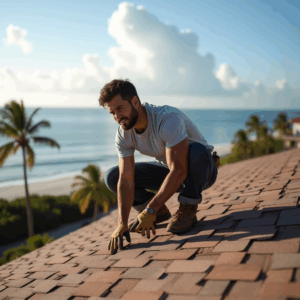 Slate is quarried stone, cut into shingles that create a distinctive, elegant look. Costs range from $15 to $30 per square foot installed, reflecting slate’s premium quality and labor-intensive installation. Slate roofs last 75 to 200 years, outlasting all other materials, and are fire-resistant, mold-resistant, and impervious to Jacksonville’s humidity and UV exposure. Their wind resistance (up to 130 mph) ensures stability during hurricanes, a critical feature in Duval County after storms like Hurricane Ian in 2022.
Slate is quarried stone, cut into shingles that create a distinctive, elegant look. Costs range from $15 to $30 per square foot installed, reflecting slate’s premium quality and labor-intensive installation. Slate roofs last 75 to 200 years, outlasting all other materials, and are fire-resistant, mold-resistant, and impervious to Jacksonville’s humidity and UV exposure. Their wind resistance (up to 130 mph) ensures stability during hurricanes, a critical feature in Duval County after storms like Hurricane Ian in 2022.
The benefits are exceptional. Slate’s natural beauty enhances historic mansions in Riverside or luxury estates in Ponte Vedra, aligning with Jacksonville’s upscale architectural trends. Its low maintenance appeals to homeowners seeking a “set-it-and-forget-it” solution. Slate’s durability makes it ideal for Duval County’s coastal and inland areas, resisting salt air and heavy rain alike.
However, slate’s high cost and weight are significant drawbacks. Installation requires structural reinforcement, especially for older Jacksonville homes, and only specialized roofing contractors in Duval County can handle it properly. Repairs, though rare, are expensive due to slate’s premium nature. These factors make slate less common in suburban areas like Arlington or Mandarin, where budget-friendly options dominate.
For Jacksonville homeowners with historic or luxury properties, slate roofing is a worthwhile investment. Its unmatched lifespan and elegance elevate properties in San Marco or Ortega, while its resilience suits Florida’s stormy climate. Homeowners must ensure their roof structure supports slate’s weight and hire experienced Jacksonville roofers to meet Duval County’s building codes. Slate offers a legacy of beauty and protection for generations.
Composite/Synthetic Roofing: Modern Durability with Versatility
Composite, or synthetic, roofing is an innovative option gaining traction among Jacksonville homeowners in Duval County. Made from recycled plastics, rubber, and polymers, composite materials mimic the look of slate, tile, or wood while offering modern durability and eco-friendly benefits. Ideal for sustainable homes in Southside or Nocatee, composite roofs blend versatility with longevity in Jacksonville’s humid climate.
Composite roofing costs $8 to $14 per square foot installed, positioning it as a mid-to-high-end option. Its lifespan of 50+ years rivals tile and metal, and its lightweight design suits a variety of Jacksonville homes without requiring structural reinforcement. Composite materials are impact-resistant, withstanding hail and debris common in Duval County’s stormy seasons, and they resist mold and mildew, thriving in Florida’s 70–90% humidity.
The advantages are compelling. Composite roofs are eco-friendly, appealing to environmentally conscious homeowners in St. Johns County. They come in diverse styles, mimicking slate for historic homes in Avondale or tile for coastal properties in Jacksonville Beach. Their low maintenance and high wind resistance (up to 130 mph) make them hurricane-ready, a key benefit after storms like Hurricane Ian in 2022. Composite roofs also offer energy efficiency, reflecting heat to reduce cooling costs in Jacksonville’s hot summers.
Drawbacks include a higher upfront cost than asphalt and a less proven track record compared to traditional materials. Some homeowners in Arlington or Mandarin may hesitate due to unfamiliarity, but composite’s durability is well-suited for Duval County’s climate. Installation requires skilled Jacksonville roofing contractors to ensure proper sealing against Florida’s heavy rains.
Composite roofing is a forward-thinking choice for Jacksonville homeowners seeking sustainability and resilience. Its versatility suits modern builds in Southside and coastal homes in Ponte Vedra, while its eco-friendly appeal aligns with Florida’s growing green trends. For those prioritizing longevity and low maintenance, composite offers a smart alternative to traditional materials in Duval County.
Comparing Roofing Materials: A Jacksonville Homeowner’s Guide
Choosing the best roofing material for your Jacksonville home in Duval County requires comparing options based on durability, cost, and suitability for Florida’s climate. Below is a detailed comparison of asphalt shingles, metal, tile, slate, and composite roofing, tailored to Jacksonville homeowners’ needs.
- Asphalt Shingles: Ideal for budget-conscious homeowners in Arlington or Westside. Affordable and versatile, they suit suburban Jacksonville homes but require maintenance to combat algae and wind damage in Duval County’s humid, stormy climate.
- Metal Roofing: A premium choice for coastal areas like Jacksonville Beach or Ponte Vedra. Its longevity and energy efficiency reduce cooling costs, while high wind resistance protects against hurricanes, making it a top pick for durability-focused homeowners.
- Tile Roofing: Perfect for historic homes in Riverside or Avondale. Tile’s storm resistance and aesthetic appeal suit Duval County’s Mediterranean-style properties, though its cost and weight limit it to upscale projects.
- Slate Roofing: The ultimate luxury option for Ortega or San Jose estates. Slate’s unmatched lifespan and elegance come at a high cost, best for homeowners seeking a legacy roof in Jacksonville’s historic districts.
- Composite Roofing: A sustainable choice for modern homes in Southside or Nocatee. Its versatility and eco-friendly design appeal to environmentally conscious Duval County residents, offering durability without the weight of tile or slate.
For coastal Jacksonville homes, metal and composite excel due to corrosion resistance. Inland areas like Mandarin benefit from asphalt’s affordability or tile’s longevity. Energy-efficient options like metal or light-colored composite suit sun-exposed Southside homes. Always consult a licensed Jacksonville roofing contractor to ensure compliance with Duval County’s 130 mph wind codes. By weighing cost, longevity, and aesthetics, you can choose the best roofing for your Jacksonville home’s needs.
Local Considerations: Duval County Regulations and Incentives
Navigating local regulations and incentives is crucial for Jacksonville homeowners planning a roof replacement in Duval County. Understanding these factors ensures compliance, maximizes savings, and enhances your roof’s longevity in Florida’s challenging climate.
Duval County enforces strict building codes, requiring roofs to withstand winds of at least 130 mph to meet Florida Building Code standards. This is critical given Jacksonville’s hurricane risks, as seen with Hurricane Ian in 2022. Homeowners must obtain permits through the City of Jacksonville’s Building Inspection Division, typically costing $100–$300 depending on the project scope. Working with a licensed Jacksonville roofing contractor familiar with these codes ensures proper installation and avoids costly fines.
Many Jacksonville neighborhoods, like Julington Creek or Deerwood, have Homeowners Associations (HOAs) that impose aesthetic guidelines. For example, HOAs may require specific colors or materials to match community standards, particularly for tile or metal roofs in upscale areas like Ponte Vedra. Check your HOA’s rules before selecting roofing materials to avoid delays or rejections.
Financial incentives can offset costs. Florida offers energy rebates for reflective roofing materials, like metal or light-colored composite, which reduce cooling costs in Jacksonville’s hot summers. The Florida Energy Office provides details on eligibility. Additionally, installing impact-resistant roofs (e.g., metal or tile) may qualify for insurance discounts, as many Duval County insurers reward hurricane-ready upgrades. Contact your provider to explore savings, especially in storm-prone areas like Jacksonville Beach.
Local tip: Choose a Jacksonville-based roofer with experience in Duval County’s permitting process and climate challenges. They’ll ensure compliance with wind codes and recommend materials suited for humidity and salt air, especially for coastal homes in Atlantic Beach. By understanding regulations and leveraging incentives, Jacksonville homeowners can invest in durable roofing materials that meet legal standards and save money long-term.
Maintenance Tips to Extend Roof Longevity in Jacksonville
Proper maintenance is key to maximizing the lifespan of your roof in Jacksonville’s humid, storm-prone climate. Duval County homeowners face unique challenges, from hurricanes to salt air, that require proactive care. These tips will help extend the longevity of any roofing material, whether you’re in Mandarin or Jacksonville Beach.
- Regular Inspections: Schedule professional inspections twice a year, ideally before and after Jacksonville’s hurricane season (June–November). Check for loose shingles, cracked tiles, or damaged flashing, especially after storms like Hurricane Ian in 2022. Coastal homes in Ponte Vedra should inspect for salt corrosion on metal components.
- Cleaning: Remove debris like leaves and branches, common in wooded areas like Julington Creek, to prevent water pooling and mold growth. Clean algae or mildew from asphalt shingles using a low-pressure wash, as Jacksonville’s 70–90% humidity fosters growth. Avoid high-pressure washing, which can damage materials.
- Repairs: Address issues promptly to prevent escalation. Fix leaks, replace missing shingles, or repair cracked tiles immediately, as Florida’s heavy rains can worsen damage. For coastal properties in Atlantic Beach, check for salt-induced wear on metal or tile roofs and reapply protective coatings as needed.
- Local Challenges: Jacksonville’s climate presents specific issues. Near the St. Johns River, humidity accelerates mold, requiring vigilant cleaning. In inland areas like Arlington, falling branches from oak trees can dent or crack roofs, so trim overhanging limbs. Coastal homes face salt air corrosion, making regular rinsing of metal or tile roofs essential.
- Hire Local Professionals: Work with Jacksonville roofing contractors who understand Duval County’s climate and building codes. Local experts, like those in Southside or Riverside, can recommend maintenance schedules tailored to your material—whether asphalt, metal, or tile—and ensure repairs meet 130 mph wind standards.
By following these maintenance tips, Jacksonville homeowners can protect their investment and avoid costly replacements. Regular care ensures your roof withstands Florida’s toughest conditions, from hurricanes to scorching summers, keeping your Duval County home safe and efficient for decades.
Conclusion: Choosing the Best Roofing Material for Your Jacksonville Home
Selecting the right roofing material for your Jacksonville home in Duval County is a critical decision that impacts longevity, aesthetics, and cost savings. From affordable asphalt shingles to luxurious slate, each material offers unique benefits tailored to Jacksonville’s humid, hurricane-prone climate. By understanding your home’s needs and Duval County’s weather challenges, you can choose a roof that protects your investment for decades.
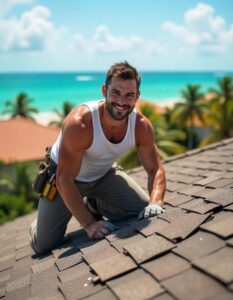 Asphalt shingles suit budget-conscious homeowners in Arlington or Mandarin, offering affordability and versatility but requiring maintenance to combat algae and wind damage. Metal roofing excels in coastal areas like Jacksonville Beach, providing durability and energy efficiency to reduce cooling costs. Tile roofs enhance historic homes in Riverside with timeless style and storm resistance, while slate offers unmatched longevity for luxury properties in Ortega. Composite roofing, popular in Nocatee, blends sustainability and resilience for modern Duval County homes.
Asphalt shingles suit budget-conscious homeowners in Arlington or Mandarin, offering affordability and versatility but requiring maintenance to combat algae and wind damage. Metal roofing excels in coastal areas like Jacksonville Beach, providing durability and energy efficiency to reduce cooling costs. Tile roofs enhance historic homes in Riverside with timeless style and storm resistance, while slate offers unmatched longevity for luxury properties in Ortega. Composite roofing, popular in Nocatee, blends sustainability and resilience for modern Duval County homes.
Jacksonville’s climate—hot summers, heavy rains, and hurricane risks like Hurricane Ian in 2022—demands materials that withstand wind, humidity, and UV exposure. Prioritize durability, energy efficiency, and compliance with Duval County’s 130 mph wind codes to ensure your roof performs. Local incentives, like energy rebates and insurance discounts, can offset costs for reflective or impact-resistant materials, making premium options more accessible.
Take the next step by consulting a licensed Jacksonville roofing contractor like Custom Roofing Solutions. They’ll assess your home’s needs, recommend materials suited for your neighborhood—whether Southside, San Marco, or Ponte Vedra—and ensure proper installation. Visit our website at https://customroofsolutions.com and contact them for a free quote to start your project. With the right roofing material, your Jacksonville home will stay protected, beautiful, and efficient in Florida’s toughest conditions for years to come.
continue reading
Related Posts
Metal roofs are a top choice for durability, energy efficiency
Introduction: Why Roof Replacement Matters in Jacksonville Your home in
Introduction: Why Durable Commercial Roofing Matters in Jacksonville Jacksonville, Florida,
SERVING TAMPA, ST. PETE & ORLANDO
Empowering Your Vision
CENTRAL FLORIDA

CALL TODAY AT (813) 644-2213
Custom Roof Solutions is proud to serve Tampa & Orlando homeowners and businesses with industry-leading roofing and solar services. Whether you need to protect your property from the unpredictable Florida weather or lower your energy costs with solar power, our experienced team is here to provide reliable solutions tailored to your needs.
SERVING JACKSONVILLE AREAS
Empowering Your Vision
NORTH FLORIDA
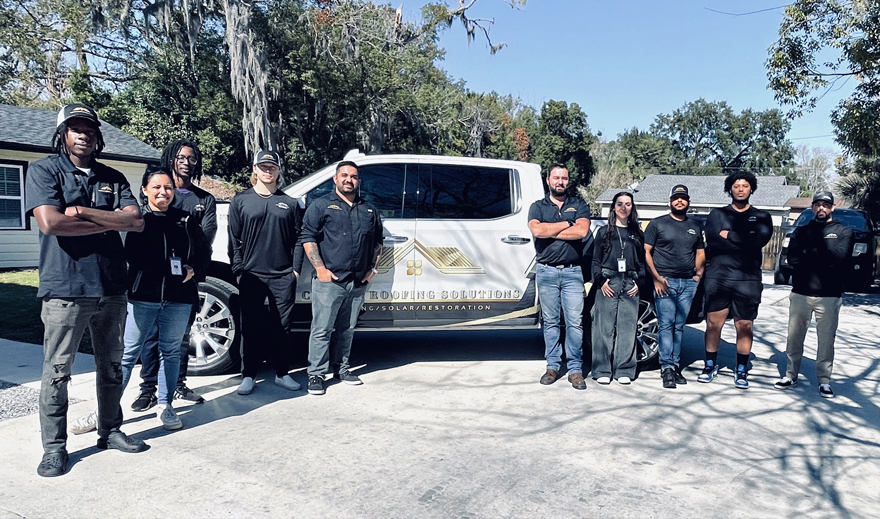
CALL TODAY AT (904) 808-3550
At Custom Roof Solutions, we understand Jacksonville’s unique weather conditions and architectural styles. Whether it’s protecting your home from hurricane-force winds, foof repairs or enhancing its curb appeal with a modern design, our experienced team delivers superior results and ensures long-lasting durability with our premium materials.
